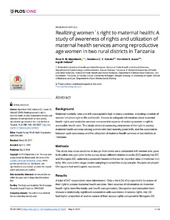| dc.contributor.author | Mpembeni, Rose N.M. | |
| dc.contributor.author | Kakoko, Deodatus C.V. | |
| dc.contributor.author | Aasen, Henriette Sinding | |
| dc.contributor.author | Helland, Ingvill | |
| dc.date.accessioned | 2019-12-11T11:36:36Z | |
| dc.date.available | 2019-12-11T11:36:36Z | |
| dc.date.issued | 2019-05-09 | |
| dc.Published | Mpembeni, Kakoko, Aasen HS, Helland. Realizing women's right to maternal health: A study of awareness of rights and utilization of maternal health services among reproductive age women in two rural districts in Tanzania. PLOS ONE. 2019;14(5):e0216027 | eng |
| dc.identifier.issn | 1932-6203 | |
| dc.identifier.uri | https://hdl.handle.net/1956/21083 | |
| dc.description.abstract | Background: Maternal mortality rates are still unacceptably high in many countries, indicating violation of women´s human right to life and health. Access to adequate information about maternal health rights and available services are essential aspects of realizing women´s right to accessible health care. This study aimed at assessing awareness of the right to access maternal health services among women who had recently given birth, and the association between such awareness and the utilization of maternal health services in two districts in Tanzania. Methods: This study was cross sectional in design. Interviews were conducted with women who gave birth within one year prior to the survey in two different district councils (DC) namely Hai DC and Morogoro DC, selected purposively based on the earlier reported rates of maternal mortality. We used a two-stage cluster sampling to select the study sample. Analysis employed Chi-square test and Logistic regression. Results: A total of 547 respondents were interviewed. Only a third (34.4%) reported to be aware of their right to access maternal health services. Main sources of information on maternal health rights were the media and health care providers. Occupation and education level showed a statistically significant association with awareness of access rights. Hai DC had higher proportion of women aware of their access rights compared to Morogoro DC. Women who were aware of their right of access were almost 5 times more likely to use skilled birth attendants compared to those who were not (AOR 4.61 95% CI: 2.14–8.57). Conclusion and recommendations: Awareness of the right to access maternal health services was low in the studied population. To increase awareness and hence uptake of Pregnancy care and skilled birth attendants at delivery we recommend the government and partners to prioritize provision of information, communication and education on women´s human rights, including the right to access maternal health services, especially to women in rural areas. | en_US |
| dc.language.iso | eng | eng |
| dc.publisher | PLOS | eng |
| dc.rights | Attribution CC BY | eng |
| dc.rights.uri | http://creativecommons.org/licenses/by/4.0 | eng |
| dc.title | Realizing women's right to maternal health: A study of awareness of rights and utilization of maternal health services among reproductive age women in two rural districts in Tanzania | eng |
| dc.type | Journal article | |
| dc.type | Peer reviewed | |
| dc.date.updated | 2019-09-30T13:06:57Z | |
| dc.description.version | publishedVersion | |
| dc.rights.holder | Copyright 2019 The Author(s) | eng |
| dc.identifier.doi | https://doi.org/10.1371/journal.pone.0216027 | |
| dc.identifier.cristin | 1707717 | |
| dc.source.journal | PLOS ONE | |

